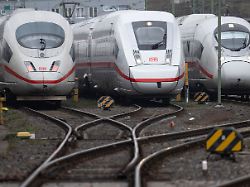This time with an announcement
GDL is on strike, every fifth long-distance train is still running
March 7, 2024, 3:51 a.m
Listen to article
This audio version was artificially generated. More info | Send feedback
35-hour strike for the 35-hour week: The train drivers’ union’s next strike has also begun in passenger transport. Travelers have to be prepared for disruptions until Friday evening. But the great uncertainty only comes afterwards.
Large parts of long-distance and regional rail transport in Germany are at a standstill again. The 35-hour strike by the German Locomotive Drivers’ Union (GDL) in the deadlocked collective bargaining dispute with Deutsche Bahn has begun. The emergency timetable, a basic service in rail transport, has been running since 2 a.m. “The DB is expecting a massive impact on rail operations on Thursday and Friday,” said a railway spokeswoman. As with previous GDL industrial disputes, only around a fifth of the long-distance trains are in use on Thursday and Friday. In regional transport, the offer can vary significantly depending on the region, where there is sometimes private competition from the railways. It was said that rail traffic should only run as usual again on Saturday. The strike in freight transport began on Wednesday evening.
GDL boss Claus Weselsky only wants to announce future strikes at short notice in the ongoing collective bargaining dispute. There will no longer be a 48-hour warning, he said at the beginning of the week. This means that journeys will become even less plannable for passengers than they already are. Weselsky is also betting that the railway will no longer be able to react in time to short-term strikes and set up an emergency timetable. “This means that the railway is no longer a reliable means of transport,” emphasized the GDL boss. In addition, the GDL did not rule out labor disputes even over Easter. “I don’t comment on vacations or public holidays, whether there are strikes or not,” Weselsky simply said.
Normal timetable only from Saturday
The old rules still apply to the strike that has now begun. The railway has canceled the train connection for Thursday and Friday. Passengers can therefore start their journey on a later day. You can find out which train is running and which isn’t on the company’s usual information platforms. The strike will last until Friday at 5 a.m. in freight transport and until 1 p.m. in passenger transport. But the limited train timetable should remain in place throughout Friday. A railway spokesman said the company would only be able to make the full range available again on Saturday.
Bahn and GDL sat together behind closed doors for four weeks to find a compromise. Two external mediators were called in: Former Federal Minister Thomas de Maizière and Schleswig-Holstein’s Prime Minister Daniel Günther – both from the CDU – moderated the negotiations. The crux of the discussions continues to be the GDL’s core demand for a reduction in weekly working hours for shift workers from 38 to 35 hours with full wage compensation.
The two moderators finally presented the two sides with a written compromise proposal that envisaged a reduction in working hours to 36 hours by 2028 in two stages. The railway reluctantly agreed, but the GDL continued to refuse and allowed the talks to fail. In the days that followed, Claus Weselsky caused irritation when he misrepresented the arbitrator’s proposal in a press conference. According to this description, the moderators’ compromise was significantly further away from the GDL demand than they actually were. Weselsky had to correct himself in the days that followed. But he didn’t back down from the strike and the negative attitude.
